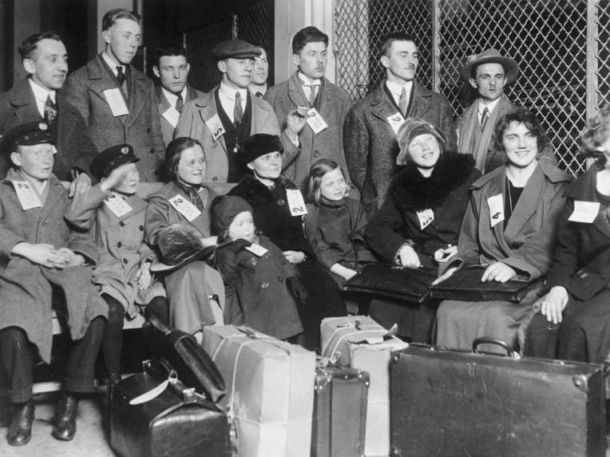 Rebuking the Trump
Administration’s increase in immigration enforcement, the South Kingstown Town
Council passed last night what it calls the Immigrant Protection Ordinance.
Rebuking the Trump
Administration’s increase in immigration enforcement, the South Kingstown Town
Council passed last night what it calls the Immigrant Protection Ordinance. The new law, approved on a 3 to 2 vote, prevents local police officers from enforcing federal immigration rules, unless so ordered by a federal judge.
“My family,” Council
Vice President Abel Collins said prior to voting in favor, “came here because
they were chased out of England for religious persecution over 300 years ago.
People are being chased out of their own country now for the same reason.
America should be the place that welcomes them and South Kingstown came make
that stand.”
Council President
Margaret Healy and Councilor Joe Veile voted against the bill, saying they
preferred a resolution instead. “We are all here for the same reason,” Healy
said. “We want our town to be safe.”
But Councilor Liz
Gledhill, a proponent of the ordinance, said changing the law is vastly
different than a resolution.
“There’s a difference
between talking about something and giving something some teeth,” Gledhill
said.
“I certainly didn’t think a year ago I would be worrying about any of this. These are unprecedented times … when I look back at this time in our history I want to know I did what was best was for the people of our community and something that I could be proud of and my kids could be proud of.”
“I certainly didn’t think a year ago I would be worrying about any of this. These are unprecedented times … when I look back at this time in our history I want to know I did what was best was for the people of our community and something that I could be proud of and my kids could be proud of.”
Councilor Bryant Da
Cruz was the swing vote. When he announced his support, the packed Council
Chambers erupted into applause.
South Kingstown, a leafy, increasingly suburban, coastal college town, isn’t fertile ground for immigration enforcement. Several community members, including Chief of Police Joe Geaber, said this was reason enough not to enact a new law.
“Usually a town
ordinance is adopted to deal with existing problems such as noise, parking,
animal control,” said Geaber. “I’m not aware of a town ordinance being passed
to deal with federal immigration issues, especially in South Kingstown where
the problem does not exist.” Like the two councilors who voted in the minority,
Geaber said a resolution was sufficient.
The change in law was
supported strongly by the University of Rhode Island community, including a
letter from URI President David Dooley.
“Some of the people
here have spoken about not seeing discrimination in this town,” said a URI
employee and member of the South Kingstown Immigration Task Force, which first
proposed the draft ordinance.
“I’m here to tell you we saw it first hand at the university, which is the reason why we brought it to you. We saw people living in fear, we saw families divided, we saw a pregnant woman separated from her husband because he couldn’t get back into the country.”
“I’m here to tell you we saw it first hand at the university, which is the reason why we brought it to you. We saw people living in fear, we saw families divided, we saw a pregnant woman separated from her husband because he couldn’t get back into the country.”
Former South Kingstown
state Rep. Mike Rice said the new law is important to URI’s ability to entice
overseas talent to the Ocean State.
“One of largest
members of the community, the University of Rhode Island, is attempting to
build rather than shrink its international connections,” Rice said, noting
international students have “a rather massive economic impact on us.”
Rice does work in
Indonesia, and said “the national government is interested in sending many
people here to South Kingstown because they feel safe here. They listen to the
news over in Indonesia and basically we need to show them a sign.”
Many longtime South
Kingstown residents spoke of the need to help the most vulnerable people, for
South Kingstown to remain a welcoming place, and to resist the Trump
Administration.
“The [Trump]
Administraiton has made clear it expects local police departments like ours to
help find and detain suspected immigration violators,” said Tim Murphy. “But
immigration enforcement has always been a federal responsibility, not a local
one.”
South Kingstown is the
first municipality to pass such a law, said Steven Brown, of the Rhode Island
American Civil Liberties Association. South Kingstown’s law is based on a draft
bill from the ACLU that has been adopted in some hundreds of jurisdictions
across the country.
“Providence’s new Community Safety Act has a few immigrant protection provisions,” according to Brown, “and a few communities like Bristol have adopted very positive but non-binding resolutions in support of immigrant rights.”
“Providence’s new Community Safety Act has a few immigrant protection provisions,” according to Brown, “and a few communities like Bristol have adopted very positive but non-binding resolutions in support of immigrant rights.”
Bob Plain is the editor/publisher
of Rhode Island's Future. Previously, he's worked as a reporter for several
different news organizations both in Rhode Island and across the country.